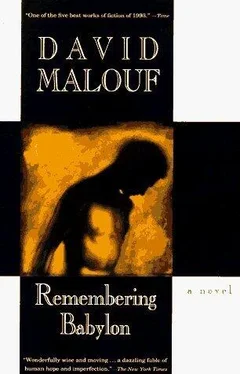Mr Herbert, the only son of the fifth son of an Earl, is in all ways the gentleman amateur, but one, Sir George finds, who has set out, almost in the spirit of contradiction, to be rigorously professional in everything he does. It is a matter of character. He is painstaking, dedicated, self-effacing and smug — this is Sir George’s view, who suspects him, correctly as it happens, of reporting unfavourably upon him to his great family at home.
Mr Herbert, who has a good deal to put up with, regards Sir George as a madman, but one he has a kind of responsibility for: an autocratic, impulsive, obstinate, ceremoniously pedantic, fantastical, profoundly humourless man with only one gift, a strong but inconvenient memory, which nature has bestowed upon him in compensation, it would appear, for his entire lack of sense.
The two men are as different as they can be.
Sir George is hungry for office and has a premonition already that the higher forms of it will elude him; not, he believes, through any fault of his own but through neglect, not to say malice, at home.
Mr Herbert is made for success but winces at it. He does not despise office, even high office, but his austere nature and distaste for every sort of public display means that he would prefer it to be anonymous; what his soul craves is privacy. He is weary of his term here, which he looks upon already as an adventure of his youth. He is weary of Sir George and his infantile vanities and crises ministérielles . He is even weary, at times, of the little boat in which, since he is fond of the outdoors and all manly pursuits, he likes to skip about on the waters of the bay, and of Herston, the fifty acres of Cambridgeshire he has established in a place that, once he leaves it, he will not revisit. All of which, and more, is in the air as the servants move behind them at table.
Mr Frazer has the sense of being an intruder here among people who have been too long shut up together, have already said everything they can bear to say to one another and are speaking in code.
‘Really, Mr Frazer,’ says Lady Bowen, ‘you should see Herston.’ (They are eating some of the Herston vegetables, so the subject has arisen quite naturally.) ‘You would think yourself in England. The peaches! So plump, and with such a blush on the skin. Even at Corfu we had nothing like them. We are very gay when we go to Herston. Mr Herbert has a machine for making ice brought all the way from India, from which he makes, with his own hands —’ the word, on the lady’s breath, hangs a little, so that Mr Frazer is aware of the knuckles in young Mr Herbert’s broad hands as he works his knife and fork — ‘the most delicious water-ice. The children are very fond of water-ice. Especially little George.’
‘Our asparagus, this year,’ Mr Herbert announces at another point, and the colour comes to his cheek, ‘is quite special. People told us, you know, that it couldn’t be done. Too damp. But there it is.’
‘And the strawberries,’ says Lady Bowen, darting a quick glance at Sir George who has put his knife and fork down, drawn himself up and is smouldering. ‘The children had never seen strawberries — actually growing . Peeping out under their little — leaves.’
This talk of fruit and vegetables, especially in the tension it seems to create, unnerves Mr Frazer. It is intended, he believes, to make way for his report. He waits for Sir George now to take up what Lady Bowen has so skilfully prepared, and wonders when he does not if he should do it. Surely not. Then it occurs to him that he has mistaken things altogether. Sir George finds this talk of gardens and strawberries and asparagus suspicious, sinister even — is that it? A way of informing him, indirectly (in which case it would be Mr Herbert’s business Lady Bowen has been doing), that his interest in the native fruit scheme is known and that if he wants to save himself from absolute folly, he had better pull out while he can. Sir George’s anxiety, Mr Frazer sees, is that he may speak out and embarrass him.
So the litany of Herston’s splendours goes on from grapes and China peaches to its mouse deer, its Breton cows, its Arabian bull, its peacocks, pheasants, guinea pigs, and, after a strained half hour of port, they retire at last to the sitting room. Here Lady Bowen, in a sweet Italian voice and with a delicate touch on the keys, sings from the sheet music Mr Herbert has brought, while Skip, at his master’s feet, looks on, and coffee is brought, and they settle into a cosy torpor in which Mr Frazer fears he may doze off.
Suddenly there is an explosion in the room. Lady Bowen has slapped her forearm. A smudge of crimson appears there, the rich blood of the Candianos, which she stares at a moment — they all do — as if she had not expected it to be quite so scarlet or so abundant. She rises and leaves the room.
Clouds of mosquitos have drifted in from the mangroves downriver — the price of the cooling breeze that has sprung up — and go sailing by with their fine legs hanging. When Lady Bowen returns the blood is gone and she has a servant with her who bears in each hand a lighted coil of some sharp smelling stuff (dried cow-manure, Mr Frazer guesses) that he sets on the floor, and from which thin smoke weaves upward and spreads.
From Sir George’s reproachful look as he takes his leave, Mr Frazer guesses that he has in some way offended. He has failed to play some role he was assigned here, which he was not clever enough, or socially adroit enough, to perceive. Or he has been too responsive to Mr Herbert; whom he finds rather attractive on the whole, very manly and unassuming and, at one moment, when he took the opportunity, perhaps foolishly, to speak of Gemmy — whose name Mr Herbert already knew — very attentive and sympathetic. Sir George has seen it and sniffed out a defection, a choice of loyalties. Anyway, next morning, at Marr’s, there is a note.
It is from the Premier and is in two parts. The first thanks him, mysteriously, for his ‘understanding’ on the previous evening. ‘I was — I presume here on your confidence — very grateful for that, as I daresay was our hostess, though I speak, of course, only for myself …’
And the second?
‘I have, after our brief conversation, been considering what might be done for Mr Fairley, whose position, I believe, was your chief reason for coming to us. I have pleasure in informing you that I have arranged for him to be offered the post of Customs Officer at the port of Bowen, at a salary of fifty pounds per annum, the official notification of which, etc, etc.’
He was astonished. Had he made himself so unclear? Was it a return for his ‘understanding’ of a situation he had not understood? Was it a joke whose humour he was expected to recognise — at the expense, perhaps, of Sir George? Was it cynicism? Was it large-handed indifference? Anyway, it was what he took back with him.
The orchards he had foreseen receded into a future that appeared increasingly remote but no more unreal to him than the place he now stood in, with the Premier’s letter in his hand, the jug and basin with their nasturtium pattern, sitting solidly on the washstand, and the busy little capital coming to life beyond the sill, all its picket fences gleaming, the relentless sunlight bouncing off its domes.
A DAY OF BUSHFIRES, brassy sky; the air stilled, smelling of char. Fine ash falling, as if the sun at last had burnt itself out and the last flakes of it were descending to cover the earth. It did not surprise him. He too felt burnt out, his skull a husk, paper-thin and rattling as he walked. He felt, as he followed the white ribbon that led to the settlement, that he had lost all weight in the world; his feet made so little impression in the dust that it was as if he had not passed, or had passed through into another being and no longer shared — with the powdery dust under his feet, the rocks, the trees along the way where he paused a moment to rest and, settling his palm against a tree trunk, felt the sap streaming up from where the giant tree was rooted — the hold these things had on the earth. He shuffled. He tottered. His tongue felt brittle in his mouth as an insect’s wing. He was going to claim back his life; to find the sheets of paper where all that had happened to him had been set down in the black blood that had so much power over his own: the events, things, people too, that sprang to life in them, Willett’s boots, the ferrets, Mosey and The Irish. Magicked into squiggles, like the ghosts of insects under bark, they had drawn the last of his spirit from him. They were drawing him to his death.
Читать дальше












